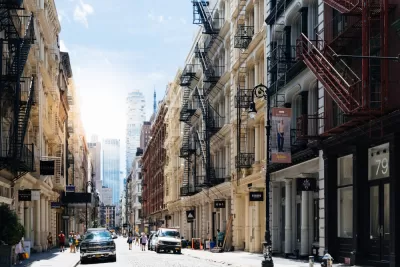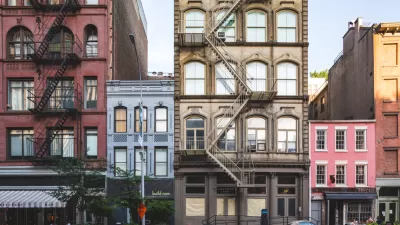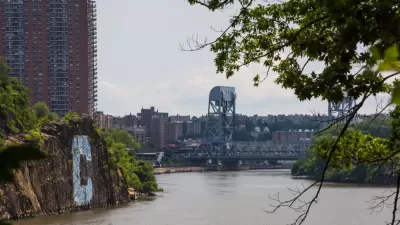Mayor Bill de Blasio is crossing the finish line of his time in office at the same time as one of the most controversial rezoning processes of his administration.

Sam Raskin reports on the latest back and forth between neighborhood advocates, local lawmakers, and the Mayor's Office surrounding a controversial rezoning process underway in the Manhattan neighborhood of SoHo, underway since 2018.
Of the numerous rezonings undertaken during the de Blasio administration, the Envision SoHo/NoHo process offers one of the first chances to add new residential zoning and affordable housing opportunities in a relatively affluent corner of the city. Much of the recent controversy centers on the lack of affordable housing capacity built into the current version of the plan, which would add 3,000 new housing units, with 900 below-market-rate apartments included in that total.
According to article, groups like the Cooper Square Committee and NoHo Bowery Stakeholders are pressing the city to add more affordable housing, and say the process has been marred by a "'troubling' lack of regard for input from neighborhood nonprofit groups," reports Raskin.
Moses Gates, vice president for housing and neighborhood planning at the Regional Plan Association, is quoted in the article discussing a, perhaps, surprising culprit in the plan's lack of affordable housing opportunities: an overabundance of parcels zoned for commercial development.
"We are all looking for significant affordable housing to be built, and I think the biggest concern is that the allowed commercial densities are too high, and that a rezoning intended for mixed-income housing will end up as a rezoning for office buildings," says Gates, as quoted in the article.
FULL STORY: De Blasio’s Soho rezoning plan doesn’t address the ‘real issues,’ pols say

Planetizen Federal Action Tracker
A weekly monitor of how Trump’s orders and actions are impacting planners and planning in America.

Maui's Vacation Rental Debate Turns Ugly
Verbal attacks, misinformation campaigns and fistfights plague a high-stakes debate to convert thousands of vacation rentals into long-term housing.

San Francisco Suspends Traffic Calming Amidst Record Deaths
Citing “a challenging fiscal landscape,” the city will cease the program on the heels of 42 traffic deaths, including 24 pedestrians.

Amtrak Rolls Out New Orleans to Alabama “Mardi Gras” Train
The new service will operate morning and evening departures between Mobile and New Orleans.

The Subversive Car-Free Guide to Trump's Great American Road Trip
Car-free ways to access Chicagoland’s best tourist attractions.

San Antonio and Austin are Fusing Into one Massive Megaregion
The region spanning the two central Texas cities is growing fast, posing challenges for local infrastructure and water supplies.
Urban Design for Planners 1: Software Tools
This six-course series explores essential urban design concepts using open source software and equips planners with the tools they need to participate fully in the urban design process.
Planning for Universal Design
Learn the tools for implementing Universal Design in planning regulations.
Heyer Gruel & Associates PA
JM Goldson LLC
Custer County Colorado
City of Camden Redevelopment Agency
City of Astoria
Transportation Research & Education Center (TREC) at Portland State University
Jefferson Parish Government
Camden Redevelopment Agency
City of Claremont





























